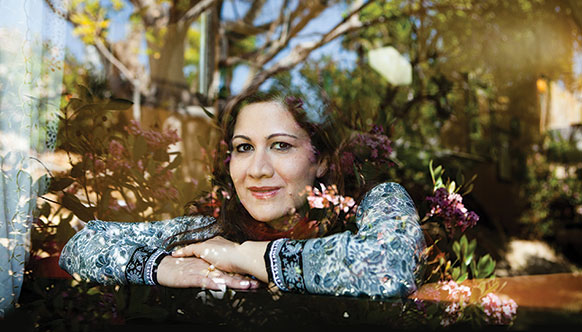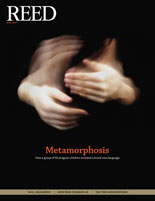
IRIS login | Reed College home Volume 92, No. 2: June 2013
Between Two Worlds

Photo by Bear Guerra
Shadab Zeest Hashmi ’95 navigates the journey from Pakistan to California.
By Bill Donahue
Shadab Zeest Hashmi grew up in Peshawar, Pakistan, in the shadow of the snowcapped Safed Koh mountains marking the border with Afghanistan. In the streets near her home, vendors sold plums and corn with salt and lime. She came to love the bakery that served pink coconut rolls and the clothes dyer who sat before boiling pots of dye listening to cricket games on the radio. Then at age 18, she left Pakistan to land at Reed.
It was 1991. That September, Nirvana would release its second album, Nevermind, replete with the smash hit “Smells Like Teen Spirit”; nose rings would become de rigueur among the more stylish habitués of the Paradox Café. And Shadab would never live in Pakistan again. You’d expect her poetry to be steeped in a longing for home, and in many ways it is. In her second book, Kohl & Chalk, published in early 2013, Shadab visits Peshawar with her three children and remembers:
afternoon shadows on slate verandahs,
the squeaking of a rusted seesaw,
the breaking open of a walnut in a door hinge;
its embossed shell a secret cracking.
The longing aches. Still, even though
Kohl & Chalk is a medley of piquant tableaux largely set in Shadab’s native land, it would be wrong to sum up the book as a sepia-tinted paean to the Pakistan of yore. The volume’s title hints at an outlook that is both cosmopolitan and gracefully political. Kohl is the black lead-based eyeliner that women in Africa and the Middle East have been wearing to dramatic effect since about 3000 BC. Shadab included it in the title because, she says, “My book is the story of a writing woman faced with the challenge of producing poetry while being responsible for raising a family.” “Chalk” is a subtle plea for education which, Shadab says, could prove a “great equalizer” in Pakistan’s viciously stratified society.
Shadab writes as a naturalized American tuned in to both the troubles with Pakistan’s nascent democracy and the cruelty that Americans have been meting out on the Arab world since 9/11. But she forgoes shrill outrage, writing instead with a sensual—one might even say maternal—compassion. In “Monsoon,” she glimpses the dark side of her border-town childhood, dwelling on a casualty of the ’80s-era war that the U.S. helped wage against the Soviet Union in Afghanistan.
I bring Socrates
from the glass shelves
Cut a mango in cubes to go with some milk
There is no need for Chopin
because the young Afghan from the
refugee camp
(who made himself
a wheelchair after the war)
plays his flute all day long to the rain’s vigorous beat.
In “Ghazal for the Ninth Month,” Shadab muses on the irony of taking the oath as an American citizen within weeks of her son’s birth:
I had sworn to bear arms for this country.
Bear arms? Kill like a predator? In other dreams I bore you through the cold months,
through snow in Julian rain in Sedona
Not for a single moment were we apart.
“Thirteenth Anniversary” celebrates Shadab’s marriage in a Pakistani idiom—“The years clip like prayer beads in the quiet hours of marble mosque”—and in “Night of the Eid Moon,” she homes in on a mother lovingly sewing a wedding dress, only to face the sad fact that this marriage too will live in the vortex of Islamophobia. Shadab envisions the dress’ sequins
falling like shrunken stars through a basin
of smoke
where the clatter of child-sized glass
bangles will amplify
Don’t Hate Me: I’m Muslim.
At boarding school in Pakistan, Shadab studied Keats and Coleridge, as well as the Urdu poets Iqbal and Ghalib. But she only got serious about poetry at Reed, where she enjoyed what she calls a “highly sensitive, customized apprenticeship” under her thesis adviser, poet Lisa Steinman [English 1976–]. Steinman helped Shadab compose a series of poems meditating on her life as a post-colonialist Pakistani. “Lisa’s strategy at our weekly meetings,” Shadab says, “was to listen to my ramblings very attentively and get a sense of what direction might be best for me. She taught me to appreciate contemporary aesthetics, all the while supporting my own thematic and aesthetic choices so that I had enough freedom to swim through the soup of the unconscious and to think of structure and the narrative of my thesis.”
At Reed, Shadab also conceived a larger project after she attended a concert of the Al-Andalus Ensemble, a group whose act features both the flamenco guitar and the Arab oud, in tribute to Spain’s long-ago convivencia, which saw Jews and Muslims living in neighborly harmony in southern Spain from 711 to 1492. Shadab’s first book, Baker of Tarifa, imagines a small coastal town during the time of the convivencia. It celebrates “Jewish leather merchants” and “Muslim botanists. Arabic is a Semitic language,” she declares in one poem.
In 2011 Shadab ventured outside poetry to write an op-ed for the Washington Post arguing for a modern-day convivencia. The piece takes issue with Pakistan’s inflexible antiblasphemy law as well as California-based Christians who had just picketed a Muslim charity event, chanting, “Muhammad was a pervert!” What both sides need, Shadab suggests, is to learn from Muhammad himself, who showed humility and mercy when the people of the war-torn city Taif pelted him and his adopted son Zaid with stones. “Gabriel appeared with a summons from the Almighty to punish the people of Taif,” Shadab writes. “Still Muhammad’s feet bled as he pleaded their case and prayed for another chance for them.”
Shadab’s next book will consider an even earlier détente. It will be about the traders who lived in and near Peshawar when it was a stop on the Silk Road during the first few centuries after Christ. “The Silk Road was a moving marketplace, a fluid and shifting convivencia,” she says. “Buddhists, Muslims, Christians, Jews, Hindus, and Parsis traded stories, traditions, and languages across different cultures.” As a poet, Shadab feels responsible for helping us to remember that golden moment. “In our times,” she says, “we have seen the devastations of literalism and intolerance—be it in the name of religion or patriotism or democracy. Convivencia is an idealistic idea, of course. But poetry is a place to dream. And perhaps to influence civilization in some small but deep way.”

LATEST COMMENTS
steve-jobs-1976 I knew Steve Jobs when he was on the second floor of Quincy. (Fall...
Utnapishtim - 2 weeks ago
Prof. Mason Drukman [political science 1964–70] This is gold, pure gold. God bless, Prof. Drukman.
puredog - 1 month ago
virginia-davis-1965 Such a good friend & compatriot in the day of Satyricon...
czarchasm - 4 months ago
John Peara Baba 1990 John died of a broken heart from losing his mom and then his...
kodachrome - 7 months ago
Carol Sawyer 1962 Who wrote this obit? I'm writing something about Carol Sawyer...
MsLaurie Pepper - 8 months ago
William W. Wissman MAT 1969 ...and THREE sisters. Sabra, the oldest, Mary, the middle, and...
riclf - 10 months ago